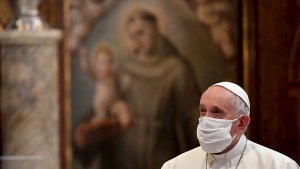Pope Francis wrapped up his general audience series on praying with the Psalms on October 21, considering that “the Psalter presents prayer as the fundamental reality of life.”
The Holy Father reflected that because prayer puts us in touch with the transcendent, it saves us from a limitless arrogance, from becoming a person “who fears no judgment regarding what he or she thinks or does.”
The reference to the absolute and to the transcendent — which the spiritual masters call the “holy fear of God” and which makes us completely human — is the boundary that saves us from ourselves, preventing us from venturing into life in a predatory and voracious manner.
Thus, he said, “Prayer is the salvation of the human being.”
Here is an excerpt of the text, emphases ours:
~
And so, prayer is not a sedative to alleviate life’s anxieties; or, in any case, this type of prayer is certainly not Christian. Rather, prayer makes each of us responsible. We see this clearly in the “Our Father” that Jesus taught His disciples.
To learn how to pray this way, the Psalter is a tremendous school. We saw how the Psalms do not always use refined and gentle language, and how they often bring out the scars of existence. And yet, all these prayers were first used in the Temple of Jerusalem and then in the synagogues; even the most intimate and personal ones. The Catechism of the Catholic Church puts it this way: “The Psalter’s many forms of prayer take shape both in the liturgy of the Temple and in the human heart” (no. 2588). And thus, personal prayer draws from and is nourished first by the prayer of the people of Israel, then by the prayer of the Church.

Read more:
With other religious leaders, Pope reflects on those who taunted Jesus: Save yourself
Even the Psalms in the first person singular, which confide the most intimate thoughts and problems of an individual, are a collective patrimony, to the point of being prayed by everyone and for everyone. The prayer of the Christian has this “breath,” this spiritual “tension” holding the temple and the world together. Prayer can begin in the penumbra of a church’s nave, but come to an end on the city streets. And vice versa, it can blossom during the day’s activities and reach its fulfilment in the liturgy. The church doors are not barriers, but permeable “membranes,” willing to allow everyone’s groans in.
The world is always present in the prayer found in the Psalter. The Psalms, for example, voice the divine promise of salvation for the weakest:.. “’Because the poor are despoiled, because the needy groan I will now arise,’ says the Lord; ‘I will place him in the safety for which he longs’ ” (12:5). Or again, they warn about the danger of worldly riches because… “Man cannot abide in his pomp, he is like the beasts that perish” (49:20). Or still, they open the horizon to God’s view of history: “The Lord brings the counsel of the nations to nought; he frustrates the plans of the peoples. The counsel of the Lord stands for ever, the thoughts of his heart to all generations” (33:10-11).
In short, where there is God, the human person must be there as well. Sacred Scripture is categorical: “We love, because he first loved us.” He always goes ahead of us. He always awaits us because He loves us first, He looks at us first, He understands us first. He always awaits us. “If any one says, ‘I love God,’ and hates his brother, he is a liar; for he who does not love his brother whom he has seen, cannot love God whom he has not seen.”
If you pray many rosaries each day but then gossip about others, and nourish grudges inside, if you hate others, this is truly artificial, it is not true. “And this commandment we have from him, that he who loves God should love his brother also” (1 Jn 4:19-21). Scripture acknowledges the case of the person who, even though he or she sincerely searches for God, never succeeds to encounter Him; but it also affirms that the tears of the poor can never be repudiated on pain of not encountering God.
God does not support the “atheism” of those who repudiate the divine image that is imprinted in every human being. That everyday atheism: I believe in God but I keep my distance from others and I allow myself to hate others. This is practical atheism. Not to recognise the human person as the image of God is a sacrilege, an abomination, the worst offence that can be directed toward the temple and the altar.
Dear brothers and sisters, may the prayers of the Psalms help us not to fall into the temptation of the “wicked,” that is, of living, and perhaps also of praying, as if God does not exist, and as if the poor do not exist.
